同位语从句专项讲解及练习含答案
同位语从句专项讲解及练习含答案
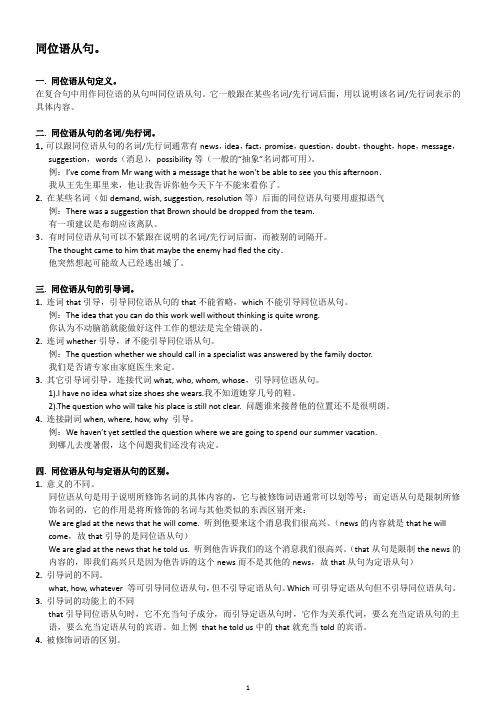
同位语从句。
一. 同位语从句定义。
在复合句中用作同位语的从句叫同位语从句。
它一般跟在某些名词/先行词后面,用以说明该名词/先行词表示的具体内容。
二. 同位语从句的名词/先行词。
1.可以跟同位语从句的名词/先行词通常有news,idea,fact,promise,question,doubt,thought,hope,message,suggestion,words(消息),possibility等(一般的“抽象”名词都可用)。
例:I’ve come from Mr wang with a message that he won’t be able to see you this afternoon.我从王先生那里来,他让我告诉你他今天下午不能来看你了。
2. 在某些名词(如demand,wish,suggestion,resolution等)后面的同位语从句要用虚拟语气例:There was a suggestion that Brown should be dropped from the team.有一项建议是布朗应该离队。
3.有时同位语从句可以不紧跟在说明的名词/先行词后面,而被别的词隔开。
The thought came to him that maybe the enemy had fled the city.他突然想起可能敌人已经逃出城了。
三. 同位语从句的引导词。
1.连词that引导,引导同位语从句的that不能省略,which不能引导同位语从句。
例:The idea that you can do this work well without thinking is quite wrong.你认为不动脑筋就能做好这件工作的想法是完全错误的。
2. 连词whether引导,if不能引导同位语从句。
例:The question whether we should call in a specialist was answered by the family doctor.我们是否请专家由家庭医生来定。
同位语从句讲解与练习
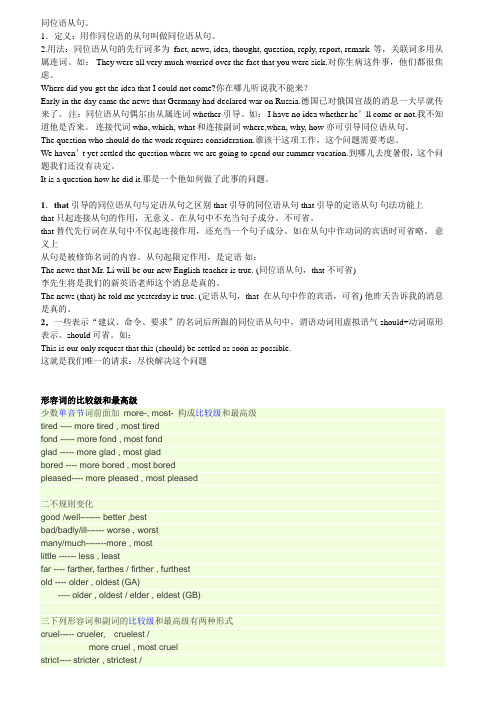
同位语从句。
1.定义:用作同位语的从句叫做同位语从句。
2.用法:同位语从句的先行词多为fact, news, idea, thought, question, reply, report, remark等,关联词多用从属连词。
如: They were all very much worried over the fact that you were sick.对你生病这件事,他们都很焦虑。
Where did you get the idea that I could not come?你在哪儿听说我不能来?Early in the day came the news that Germany had declared war on Russia.德国已对俄国宣战的消息一大早就传来了。
注:同位语从句偶尔由从属连词whether引导。
如: I have no idea whether he’ll come or not.我不知道他是否来。
连接代词who, which, what和连接副词where,when, why, how亦可引导同位语从句。
The question who should do the work requires consideration.谁该干这项工作,这个问题需要考虑。
We haven’t yet settled the question where we are going to spend our summer vacation.到哪儿去度暑假,这个问题我们还没有决定。
It is a question how he did it.那是一个他如何做了此事的问题。
1.that引导的同位语从句与定语从句之区别 that引导的同位语从句 that引导的定语从句句法功能上that只起连接从句的作用,无意义。
在从句中不充当句子成分。
不可省。
that替代先行词在从句中不仅起连接作用,还充当一个句子成分。
高考同位语从句详解与习题
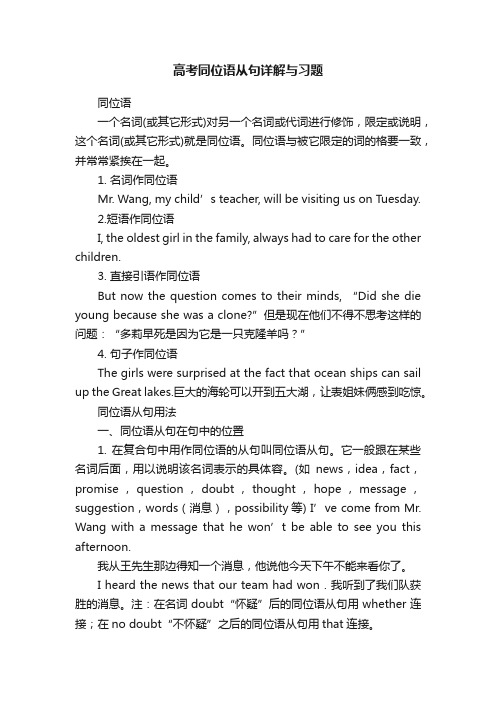
高考同位语从句详解与习题同位语一个名词(或其它形式)对另一个名词或代词进行修饰,限定或说明,这个名词(或其它形式)就是同位语。
同位语与被它限定的词的格要一致,并常常紧挨在一起。
1. 名词作同位语Mr. Wang, my child’s teacher, will be visiting us on Tuesday.2.短语作同位语I, the oldest girl in the family, always had to care for the other children.3. 直接引语作同位语But now the question comes to their minds, “Did she die young because she was a clone?”但是现在他们不得不思考这样的问题:“多莉早死是因为它是一只克隆羊吗?”4. 句子作同位语The girls were surprised at the fact that ocean ships can sail up the Great lakes.巨大的海轮可以开到五大湖,让表姐妹俩感到吃惊。
同位语从句用法一、同位语从句在句中的位置1. 在复合句中用作同位语的从句叫同位语从句。
它一般跟在某些名词后面,用以说明该名词表示的具体容。
(如news,idea,fact,promise,question,doubt,thought,hope,message,suggestion,words(消息),possibility等) I’ve come from Mr. Wang with a message that he won’t be able to see you this afternoon.我从王先生那边得知一个消息,他说他今天下午不能来看你了。
I heard the news that our team had won.我听到了我们队获胜的消息。
同位语从句讲解及练习含答案
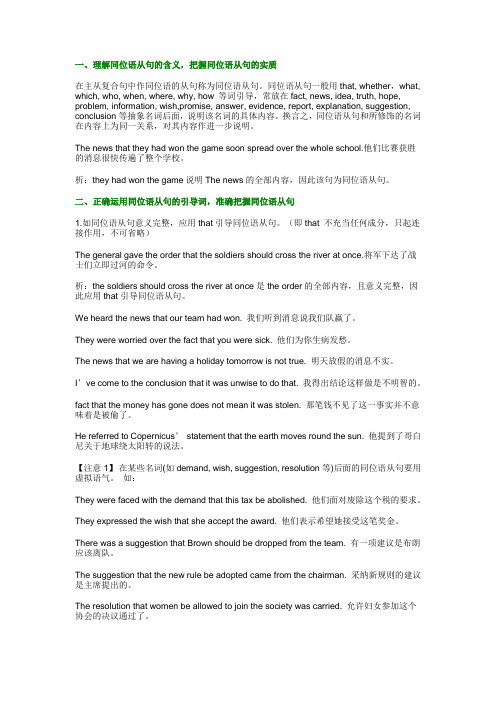
一、理解同位语从句的含义,把握同位语从句的实质在主从复合句中作同位语的从句称为同位语从句。
同位语从句一般用that, whether,what, which, who, when, where, why, how 等词引导,常放在fact, news, idea, truth, hope, problem, information, wish,promise, answer, evidence, report, explanation, suggestion, conclusion等抽象名词后面,说明该名词的具体内容。
换言之,同位语从句和所修饰的名词在内容上为同一关系,对其内容作进一步说明。
The news that they had won the game soon spread over the whole school.他们比赛获胜的消息很快传遍了整个学校。
析:they had won the game说明The news的全部内容,因此该句为同位语从句。
二、正确运用同位语从句的引导词,准确把握同位语从句1.如同位语从句意义完整,应用that引导同位语从句。
(即that 不充当任何成分,只起连接作用,不可省略)The general gave the order that the soldiers should cross the river at once.将军下达了战士们立即过河的命令。
析:the soldiers should cross the river at once是the order的全部内容,且意义完整,因此应用that引导同位语从句。
We heard the news that our team had won. 我们听到消息说我们队赢了。
They were worried over the fact that you were sick. 他们为你生病发愁。
The news that we are having a holiday tomorrow is not true. 明天放假的消息不实。
同位语从句讲解及练习含答案
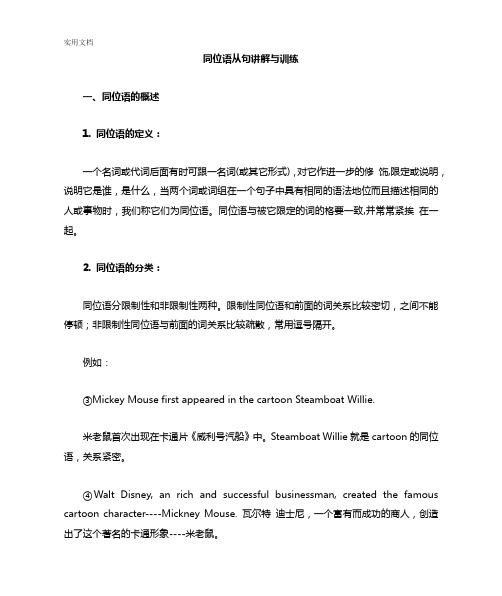
同位语从句讲解与训练一、同位语的概述1. 同位语的定义:一个名词或代词后面有时可跟一名词(或其它形式),对它作进一步的修饰,限定或说明,说明它是谁,是什么,当两个词或词组在一个句子中具有相同的语法地位而且描述相同的人或事物时,我们称它们为同位语。
同位语与被它限定的词的格要一致,并常常紧挨在一起。
2. 同位语的分类:同位语分限制性和非限制性两种。
限制性同位语和前面的词关系比较密切,之间不能停顿;非限制性同位语与前面的词关系比较疏散,常用逗号隔开。
例如:③Mickey Mouse first appeared in the cartoon Steamboat Willie.米老鼠首次出现在卡通片《威利号汽船》中。
Steamboat Willie就是cartoon的同位语,关系紧密。
④Walt Disney, an rich and successful businessman, created the famous cartoon character----Mickney Mouse. 瓦尔特迪士尼,一个富有而成功的商人,创造出了这个著名的卡通形象----米老鼠。
an rich and successful man 是主语Walt Disney的同位语,句子中有没有它,无所谓,不影响理解。
而且“瓦尔特迪士尼”是个“富有而成功的商人”,反过来,“一个富有而成功的商人”可不一定就是“瓦尔特迪士尼”。
3. 同位语的形式:(1)名词用作同位语时最多:①This is Mr.Brown,our Spanish teacher.这是我们的西班牙语老师布朗先生。
②“Leave it to me,”said Lao He,the man on night duty.值夜班的人老何说:“这事交给我。
”③You girls may take those seats over there.你们姑娘们可以坐在那边的座位上。
初中英语语法同位语从句讲解专项练习及答案
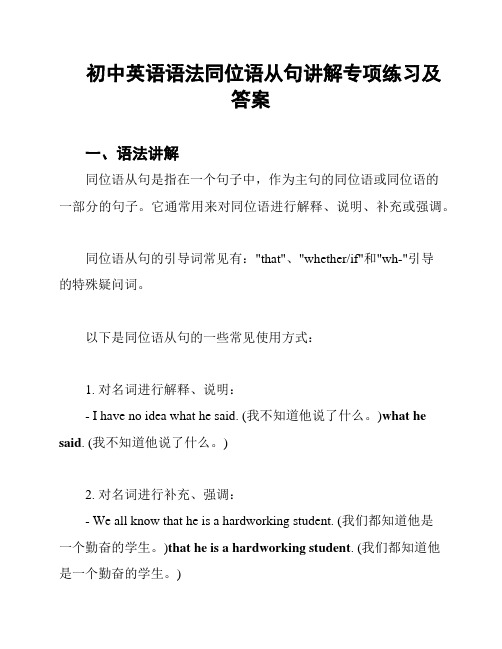
初中英语语法同位语从句讲解专项练习及答案一、语法讲解同位语从句是指在一个句子中,作为主句的同位语或同位语的一部分的句子。
它通常用来对同位语进行解释、说明、补充或强调。
同位语从句的引导词常见有:"that"、"whether/if"和"wh-"引导的特殊疑问词。
以下是同位语从句的一些常见使用方式:1. 对名词进行解释、说明:- I have no idea what he said. (我不知道他说了什么。
)what he said. (我不知道他说了什么。
)2. 对名词进行补充、强调:- We all know that he is a hardworking student. (我们都知道他是一个勤奋的学生。
)that he is a hardworking student. (我们都知道他是一个勤奋的学生。
)- The fact remains that she is guilty. (事实仍然是她有罪。
)that she is guilty. (事实仍然是她有罪。
)3. 对名词进行特殊疑问:- Could you tell me where he lives? (你能告诉我他住在哪里吗?)where he lives? (你能告诉我他住在哪里吗?)同位语从句用来修饰名词,起到进一步解释、补充或强调的作用。
二、练题及答案请根据以下句子中的同位语,填写合适的同位语从句。
1. We are all aware of the fact ____ he is a talented musician.the fact ____ he is a talented musician.- that2. The question whether ____ to attend the party or not is up to you.whether ____ to attend the party or not is up to you.- whether/if- why4. His only hope is that ____ he can pass the exam.that ____ he can pass the exam.- that5. We have no idea what ____ happened to him after the accident.what ____ happened to him after the accident.- what6. I doubt whether ____ she will be able to finish the project on time.whether ____ she will be able to finish the project on time.- whether/if7. I am curious about the place ____ they went for vacation.the place ____ they went for vacation.- where8. It is important to know what ____ happened during the meeting.what ____ happened during the meeting.- what9. His dream is that ____ he can travel around the world.that ____ he can travel around the world.- that10. The fact remains that ____ she is innocent.that ____ she is innocent.- that三、练答案1. We are all aware of the fact that he is a talented musician.the fact that he is a talented musician.2. The question whether to attend the party or not is up toyou.whether to attend the party or not is up to you.4. His only hope is that he can pass the exam.that he can pass the exam.5. We have no idea what happened to him after the accident.what happened to him after the accident.6. I doubt whether she will be able to finish the project ontime.whether she will be able to finish the project on time.7. I am curious about the place where they went for vacation.the place where they went for vacation.8. It is important to know what happened during the meeting.what happened during the meeting.9. His dream is that he can travel around the world.that he can travel around the world.10. The fact remains that she is innocent.that she is innocent.以上是初中英语语法同位语从句的讲解及练习题及答案。
高中-同位语从句详细讲解与练习(附答案)
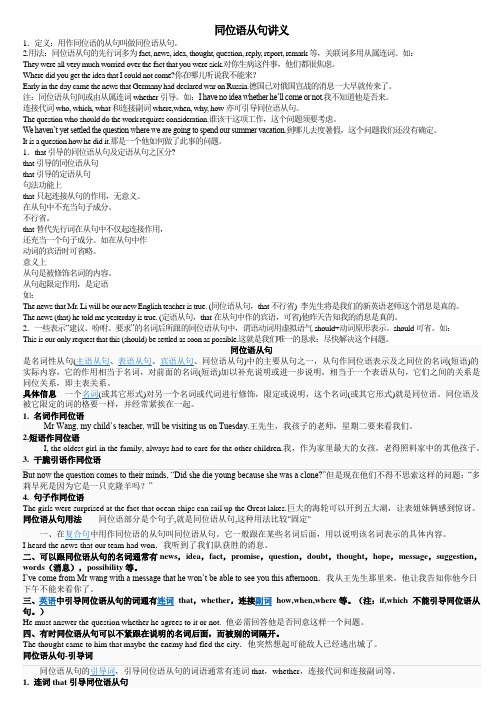
同位语从句讲义1.定义:用作同位语的从句叫做同位语从句。
2.用法:同位语从句的先行词多为fact, news, idea, thought, question, reply, report, remark等,关联词多用从属连词。
如:They were all very much worried over the fact that you were sick.对你生病这件事,他们都很焦虑。
Where did you get the idea that I could not come?你在哪儿听说我不能来?Early in the day came the news that Germany had declared war on Russia.德国已对俄国宣战的消息一大早就传来了。
注:同位语从句间或由从属连词whether引导。
如:I have no idea whether he’ll come or not.我不知道他是否来。
连接代词who, which, what和连接副词where,when, why, how亦可引导同位语从句。
The question who should do the work requires consideration.谁该干这项工作,这个问题须要考虑。
W e haven’t yet settled the question where we are going to spend our summer vacation.到哪儿去度暑假,这个问题我们还没有确定。
It is a question how he did it.那是一个他如何做了此事的问题。
1.that引导的同位语从句及定语从句之区分?that引导的同位语从句that引导的定语从句句法功能上that只起连接从句的作用,无意义。
在从句中不充当句子成分。
不行省。
that替代先行词在从句中不仅起连接作用,还充当一个句子成分。
同位语从句及练习题(含答案)
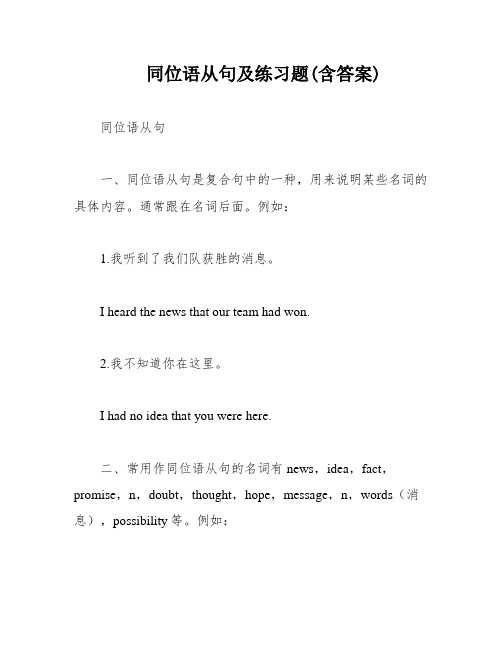
同位语从句及练习题(含答案)同位语从句一、同位语从句是复合句中的一种,用来说明某些名词的具体内容。
通常跟在名词后面。
例如:1.我听到了我们队获胜的消息。
I heard the news that our team had won.2.我不知道你在这里。
I had no idea that you were here.二、常用作同位语从句的名词有news,idea,fact,promise,n,doubt,thought,hope,message,n,words(消息),possibility等。
例如:我从XXX那里来,他让我告诉你他今天下午不能来看你了。
I’ve come from Mr。
Wang with a message that he won’t be able to see you this afternoon.三、引导同位语从句的词有连词that。
whether,连接副词how。
when。
where等。
但if。
which不能引导同位语从句。
例如:4.我不知道他什么时候回来。
I have no idea when he will be back.5.他必须回答他是否同意这样一个问题。
XXX whether he agrees to it or not.四、同位语从句有时可以被别的词隔开,不紧跟在说明的名词后面。
例如:6.几年以后,有消息传来说XXX要亲自视察他们。
Several years later。
word XXX.7.他突然想起可能敌人已经逃出城了。
XXX to him that maybe the enemy had fled the city.五、同位语从句与定语从句的区别在于同位语从句与前面的名词是同位关系,即说明它前面名词的内容;而定语从句与前面的名词是修饰与被修饰关系,即限定它前面的名词范围,或补充一些情况。
例如:The news that they had won the game soon spread over the whole school.The general gave the order that the soldiers should cross the river at once.We'll discuss the problem of whether the sports meeting will be held on time.I have no n of how he went home。
(完整版)高考同位语从句详解与习题
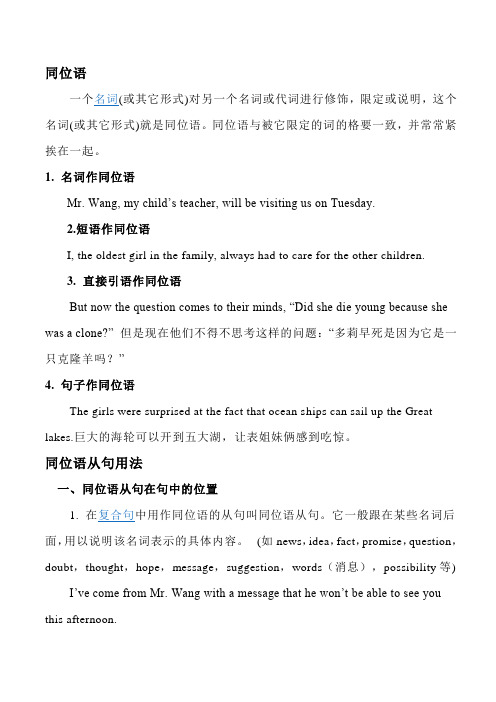
同位语一个名词(或其它形式)对另一个名词或代词进行修饰,限定或说明,这个名词(或其它形式)就是同位语。
同位语与被它限定的词的格要一致,并常常紧挨在一起。
1. 名词作同位语Mr. Wang, my child’s teacher, will be visiting us on Tuesday.2.短语作同位语I, the oldest girl in the family, always had to care for the other children.3. 直接引语作同位语But now the question comes to their minds, “Did she die young because she was a clone?”但是现在他们不得不思考这样的问题:“多莉早死是因为它是一只克隆羊吗?”4. 句子作同位语The girls were surprised at the fact that ocean ships can sail up the Great lakes.巨大的海轮可以开到五大湖,让表姐妹俩感到吃惊。
同位语从句用法一、同位语从句在句中的位置1. 在复合句中用作同位语的从句叫同位语从句。
它一般跟在某些名词后面,用以说明该名词表示的具体内容。
(如news,idea,fact,promise,question,doubt,thought,hope,message,suggestion,words(消息),possibility等) I’ve come from Mr. Wang with a message that he won’t be able to see you this afternoon.我从王先生那边得知一个消息,他说他今天下午不能来看你了。
I heard the news that our team had won.我听到了我们队获胜的消息。
注:在名词doubt“怀疑”后的同位语从句用whether连接;在no doubt“不怀疑”之后的同位语从句用that连接。
完整版)高中-同位语从句详细讲解与练习(附答案)
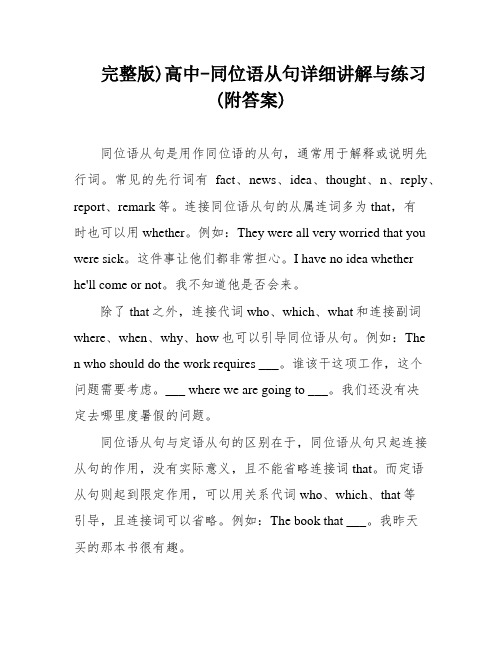
完整版)高中-同位语从句详细讲解与练习(附答案)同位语从句是用作同位语的从句,通常用于解释或说明先行词。
常见的先行词有fact、news、idea、thought、n、reply、report、remark等。
连接同位语从句的从属连词多为that,有时也可以用whether。
例如:They were all very worried that you were sick。
这件事让他们都非常担心。
I have no idea whetherhe'll come or not。
我不知道他是否会来。
除了that之外,连接代词who、which、what和连接副词where、when、why、how也可以引导同位语从句。
例如:The n who should do the work requires ___。
谁该干这项工作,这个问题需要考虑。
___ where we are going to ___。
我们还没有决定去哪里度暑假的问题。
同位语从句与定语从句的区别在于,同位语从句只起连接从句的作用,没有实际意义,且不能省略连接词that。
而定语从句则起到限定作用,可以用关系代词who、which、that等引导,且连接词可以省略。
例如:The book that ___。
我昨天买的那本书很有趣。
同位语从句是指在复合句中作为同位语的从句,一般紧跟在某些名词后面,用以说明该名词表示的具体内容。
比较常用的名词有news,idea,fact,promise,n,doubt,thought,hope,message,n,words(消息),possibility等。
例如,I heard the news that our team had won.(我听到了我们队获胜的消息。
)同位语从句的引导词包括连词that,whether,连接代词和连接副词等。
在某些名词后面的同位语从句要用虚拟语气,如demand。
wish。
同位语从句(含配套练习与答案)
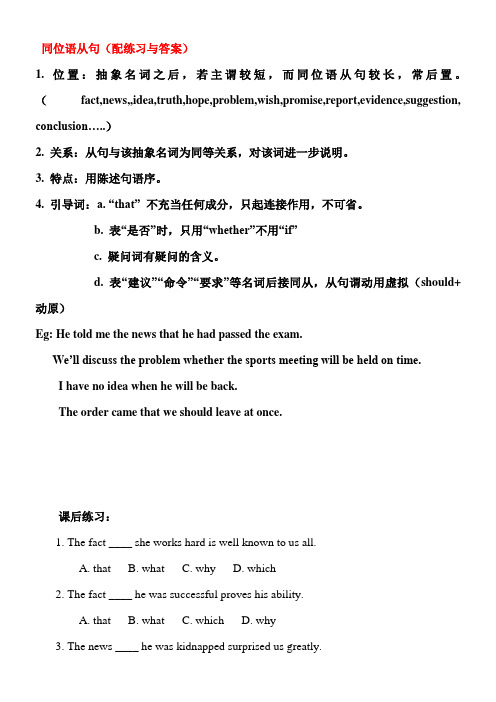
同位语从句(配练习与答案)1. 位置:抽象名词之后,若主谓较短,而同位语从句较长,常后置。
(fact,news,,idea,truth,hope,problem,wish,promise,report,evidence,suggestion, conclusion…..)2. 关系:从句与该抽象名词为同等关系,对该词进一步说明。
3. 特点:用陈述句语序。
4. 引导词:a. “that” 不充当任何成分,只起连接作用,不可省。
b. 表“是否”时,只用“whether”不用“if”c. 疑问词有疑问的含义。
d. 表“建议”“命令”“要求”等名词后接同从,从句谓动用虚拟(should+动原)Eg: He told me the news that he had passed the exam.We’ll discuss the problem whether the sports meeting will be held on time.I have no idea when he will be back.The order came that we should leave at once.课后练习:1. The fact ____ she works hard is well known to us all.A. thatB. whatC. whyD. which2. The fact ____ he was successful proves his ability.A. thatB. whatC. whichD. why3. The news ____ he was kidnapped surprised us greatly.A. whatB. thatC. whyD. when4. His suggestion ____ the meeting be delayed was turned down.A. whichB. thatC./D. it5. I have no idea ____ he will start.A. whenB. thatC. whatD./6. I've come from the government with a message ____ the meeting won't be held tomorrow.A. ifB. thatC. whetherD. which7. The thought ____ he might fail in the exam worried him.A. whenB. whichC. whatD. that8. The order ____ the prisoner be set free arrived too late.A. whichB. whetherC. thatD. what9. The nurses are trying their best to reduce the patient's fear ____ he would die of the disease.A. thatB. asC. of whichD. which10. He often asked me the question ____ the work was worth doing.A. whetherB. whereC. thatD. whenKeys: 1-5 AABBA 6-10 BDCAA。
(完整版)语法:同位语从句讲解及习题
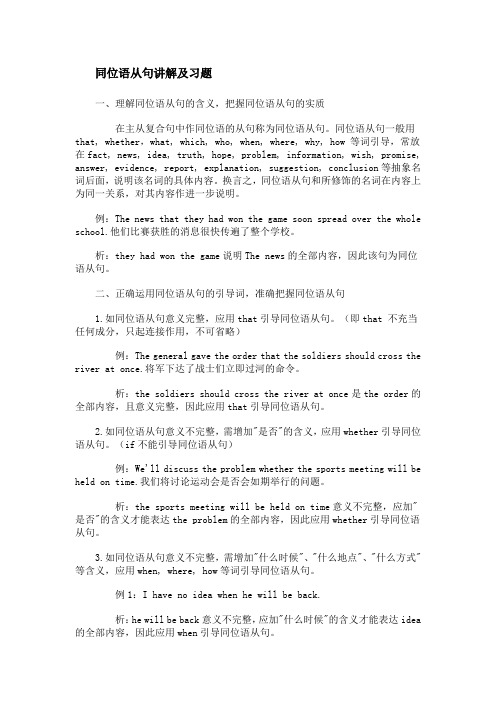
同位语从句讲解及习题一、理解同位语从句的含义,把握同位语从句的实质在主从复合句中作同位语的从句称为同位语从句。
同位语从句一般用that, whether,what, which, who, when, where, why, how 等词引导,常放在fact, news, idea, truth, hope, problem, information, wish, promise, answer, evidence, report, explanation, suggestion, conclusion等抽象名词后面,说明该名词的具体内容。
换言之,同位语从句和所修饰的名词在内容上为同一关系,对其内容作进一步说明。
例:The news that they had won the game soon spread over the whole school.他们比赛获胜的消息很快传遍了整个学校。
析:they had won the game说明The news的全部内容,因此该句为同位语从句。
二、正确运用同位语从句的引导词,准确把握同位语从句1.如同位语从句意义完整,应用that引导同位语从句。
(即that 不充当任何成分,只起连接作用,不可省略)例:The general gave the order that the soldiers should cross the river at once.将军下达了战士们立即过河的命令。
析:the soldiers should cross the river at once是the order的全部内容,且意义完整,因此应用that引导同位语从句。
2.如同位语从句意义不完整,需增加"是否"的含义,应用whether引导同位语从句。
(if不能引导同位语从句)例:We'll discuss the problem whether the sports meeting will be held on time.我们将讨论运动会是否会如期举行的问题。
(完整word版)高中同位语从句精讲和练习题.docx

同位语从句讲解是名词性从句 (主语从句、表语从句、宾语从句、同位语从句 )中的主要从句之一,从句作同位语表示与之同位的名词 (短语 )的实际内容,它的作用相当于名词,对前面的名词 (短语 )加以补充说明或进一步解释,相当于一个表语从句,它们之间的关系是同位关系,即主表关系。
详细信息一个名词 (或其它形式 )对另一个名词或代词进行修饰,限定或说明,这个名词 (或其它形式 )就是同位语。
同位语与被它限定的词的格要一致,并常常紧挨在一起。
1.名词作同位语Mr Wang, my child’achster, will be visiting us on Tuesday王.先生,我孩子的老师,星期二要来看我们。
2.短语作同位语I, the oldest girl in the family, always had to care for the other children.我,作为家里最大的女孩,老得照料家中的其他孩子。
3.直接引语作同位语But now the question comes to their minds,“ Did she die youngshewasbecauseclone?”但是现在他们不得不思考这样的问题:“多莉早死是因为它是一只克隆羊吗?”4.句子作同位语The girls were surprised at the fact that ocean ships can sail up the Great lakes.巨大的海轮可以开到五大湖,让表姐妹俩感到吃惊。
同位语从句用法同位语部分是个句子 ,就是同位语从句 ,这种用法比较 "固定 "一、在复合句中用作同位语的从句叫同位语从句。
它一般跟在某些名词后面,用以说明该名词表示的具体内容。
I heard the news that our team had won.我听到了我们队获胜的消息。
二、可以跟同位语从句的名词通常有 news,idea,fact,promise,question ,doubt ,thought ,hope,message, suggestion, words(消息), possibility 等。
同位语从句讲解及练习
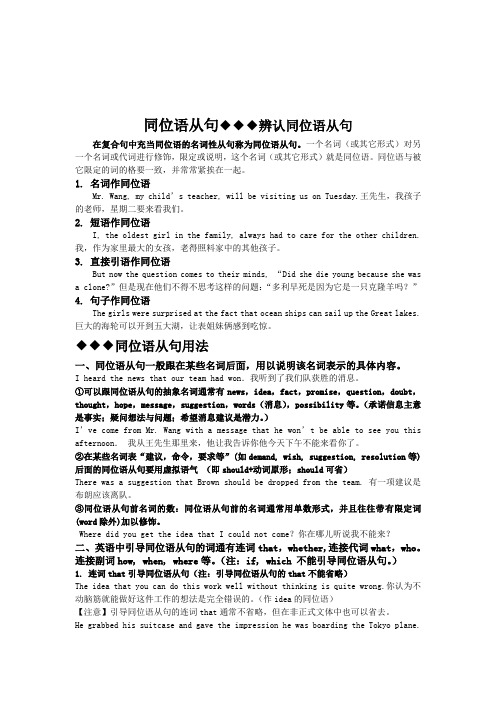
同位语从句◆◆◆辨认同位语从句在复合句中充当同位语的名词性从句称为同位语从句。
一个名词(或其它形式)对另一个名词或代词进行修饰,限定或说明,这个名词(或其它形式)就是同位语。
同位语与被它限定的词的格要一致,并常常紧挨在一起。
1. 名词作同位语Mr. Wang, my child’s teacher, will be visiting us on Tuesday.王先生,我孩子的老师,星期二要来看我们。
2. 短语作同位语I, the oldest girl in the family, always had to care for the other children.我,作为家里最大的女孩,老得照料家中的其他孩子。
3. 直接引语作同位语But now the question comes to their minds, “Did she die young because she wasa clone?”但是现在他们不得不思考这样的问题:“多利早死是因为它是一只克隆羊吗?”4. 句子作同位语The girls were surprised at the fact that ocean ships can sail up the Great lakes.巨大的海轮可以开到五大湖,让表姐妹俩感到吃惊。
◆◆◆同位语从句用法一、同位语从句一般跟在某些名词后面,用以说明该名词表示的具体内容。
I heard the news that our team had won.我听到了我们队获胜的消息。
①可以跟同位语从句的抽象名词通常有news,idea,fact,promise,question,doubt,thought,hope,message,suggestion,words(消息),possibility等。
(承诺信息主意是事实;疑问想法与问题;希望消息建议是潜力。
)I’ve come from Mr. Wang with a message that he won’t be able to see you this afternoon.我从王先生那里来,他让我告诉你他今天下午不能来看你了。
高中英语同位语从句练习(含解析)

同位语从句练习一、语法填空I.The fact the money was gone does not mean itwas stolen.1.1'm sorry to hear the awful news your brotherdied at a young age.3.We have some doubt he can win the first prize.4.Most importantly, you should always hold the belief you are sure to succeed as long as you keep yourdirection all the time.5.The fact I was a foreigner was a bigdisadvantage.6.We all agree with the idea we should makemost of our time to study.7.When I heard the news our team had won, I burstinto tears.8.The manager put forward a suggestion we should havean assistant.There is too much work to do .9.According to the professor, the question it is right orwrong depends on the final result of the experiment.10.I am in favor of the view we must make full use of the existing technical equipment.21.Is there any possibility _________ their team will win in thefinal?12.Word came ___________ the astronomers had taken the first everimage of a black hole, which is located in a distant galaxy.13.There ’ s no doubt _____________ she will run out of money very soon if she spends like this.14.The possibility _________ there is life on other planets in the universe has always inspired scientists to explore the outer space.15.The patient ’sosn asked the doctor the question _________ hisfather could survive the big operation.二、单句改错:1.1he fact whether man has landed on the moon is true.1.5he expresses her hope whether she will come and visit China again.1.6c ould no longer ignore the fact what he was unhappy.4.Dad made a promise he would buy me a new iPad if I passed the English test.5.There is no doubt whether teachers play an important role in children ’ s growth.6.The news they had won the game soon spread over the whole school.7.However, we can ’ otverlook the fact it must be operated with a phone and a network.8.The news which he won the first prize is true.9.Many children are not aware of the fact which life is hard for their parents.10.We are glad at the news the headmaster will join us in hiking this Sunday.11.There is no doubt if English has become a universal language nowadays.12.We shared the belief what if you ’ refortunate enough to have success, you should put something back.13.The news which my brother failed to win the speech contest isreally disappointed.14.Finally I want to express my hope which all the young fellows can make full use of time, because time and tide wait for no man.15.There is a popular belief among parents who schools don ’ pt ay any attention to handwriting.同位语从句参考答案语法填空:1.答案:that解析:考查同位语从句。
高中同位语从句的专项习题 有答案

2.6同位语从句的专项习题一、同位语从句的定义同位语从句是用以解释、说明某一名词内容的从句,它总是跟在改词的后面。
二、同位语从句修饰的名词idvice belief doubt explanation fact fear feeling hopeidea news opinion order possibility promise problenprobability question reply report suggstion thoughttruth wish warning三、连接词引导同位语从句的词主要有that,whether,who,why, when,where, how等。
(注:if,which 不能引导同位语从句。
)①同位语从句是意义完整的陈述句时,用连词that引导。
注:that在从句中不充当任何成分,只起连接作用,通常不省略。
I got the news that he would come to see me the next week.②同位语从句是疑问句时,应根据语境选用who, when ,where, how, whether(不能用if)等词来引导。
The question who is the best for the job requires consideration.③分隔式同位语从句:当主句的谓语较短,而同位语从句较长时,为了使句子保持平衡,常把同位语从句后置。
An idea came to him that he could buy her a diamond ring.④当advice, order, suggestion等词表示建议、命令的词后的同位语从句中的谓语动词须用(should) +动词原形He made the suggestion that the meeting(should) be put off.专项练习1.The fact ________ she works hard is well known to us all.A.thatB.whatC.whyD.which2.The fact ________ he was successful proves his ability.A.thatB.whatC.whichD.why3.The news ________ he was kidnapped surprised us greatly.A.whatB.thatC.whyD.when4.His suggestion ________ the meeting be delayed was turned down.A.whichB.thatC./D. it5.I have no idea ________ he will start.A.whenB.thatC.whatD./6.I've come from the government with a message ________ the meeting won't be held tomorrow.A.ifB.thatC.whetherD.which7.The thought ________ he might fail in the exam worried him.A.whenB.whichC.whatD.that8.The order ________ the prisoner be set free arrived too late.A.whichB.whetherC.thatD.what9.The nurses are trying their best to reduce the patient's fear ________ he would die of the disease.A.thatB.asC.of whichD.which10.He often asked me the question ________ the work was worth doing.A.whetherB.whereC.thatD.when11.The reason ________the little actress has been such a success is ________she is both clever and hard-working.A.why, whyB.why, thatC.that, becauseD.for, because12.________troubles me is ________I can’t learn all t hese English idioms by heart.A. That, thatB. What, whatC. That, whatD. What, that1-5 AABBA 6-10 BDCAA 11-12 BA。
- 1、下载文档前请自行甄别文档内容的完整性,平台不提供额外的编辑、内容补充、找答案等附加服务。
- 2、"仅部分预览"的文档,不可在线预览部分如存在完整性等问题,可反馈申请退款(可完整预览的文档不适用该条件!)。
- 3、如文档侵犯您的权益,请联系客服反馈,我们会尽快为您处理(人工客服工作时间:9:00-18:30)。
同位语从句。
一. 同位语从句定义。
在复合句中用作同位语的从句叫同位语从句。
它一般跟在某些名词/先行词后面,用以说明该名词/先行词表示的具体内容。
二. 同位语从句的名词/先行词。
1.可以跟同位语从句的名词/先行词通常有news,idea,fact,promise,question,doubt,thought,hope,message,suggestion,words(消息),possibility等(一般的“抽象”名词都可用)。
例:I’ve come from Mr wang with a message that he won’t be able to see you this afternoon.
我从王先生那里来,他让我告诉你他今天下午不能来看你了。
2. 在某些名词(如demand,wish,suggestion,resolution等)后面的同位语从句要用虚拟语气
例:There was a suggestion that Brown should be dropped from the team.
有一项建议是布朗应该离队。
3.有时同位语从句可以不紧跟在说明的名词/先行词后面,而被别的词隔开。
The thought came to him that maybe the enemy had fled the city.
他突然想起可能敌人已经逃出城了。
三. 同位语从句的引导词。
1.连词that引导,引导同位语从句的that不能省略,which不能引导同位语从句。
例:The idea that you can do this work well without thinking is quite wrong.
你认为不动脑筋就能做好这件工作的想法是完全错误的。
2. 连词whether引导,if不能引导同位语从句。
例:The question whether we should call in a specialist was answered by the family doctor.
我们是否请专家由家庭医生来定。
3.其它引导词引导,连接代词what,who,whom,whose,引导同位语从句。
1).I have no idea what size shoes she wears.我不知道她穿几号的鞋。
2).The question who will take his place is still not clear. 问题谁来接替他的位置还不是很明朗。
4. 连接副词when,where,how,why 引导。
例:We haven’t yet settled the question where we are going to spend our summer vacation.
到哪儿去度暑假,这个问题我们还没有决定。
四. 同位语从句与定语从句的区别。
1. 意义的不同。
同位语从句是用于说明所修饰名词的具体内容的,它与被修饰词语通常可以划等号;而定语从句是限制所修饰名词的,它的作用是将所修饰的名词与其他类似的东西区别开来:
We are glad at the news that he will come. 听到他要来这个消息我们很高兴。
(news的内容就是that he will come,故that引导的是同位语从句)
We are glad at the news that he told us. 听到他告诉我们的这个消息我们很高兴。
(that从句是限制the news的内容的,即我们高兴只是因为他告诉的这个news而不是其他的news,故that从句为定语从句)
2.引导词的不同。
what,how,whatever 等可引导同位语从句,但不引导定语从句。
Which可引导定语从句但不引导同位语从句。
3. 引导词的功能上的不同
that引导同位语从句时,它不充当句子成分,而引导定语从句时,它作为关系代词,要么充当定语从句的主语,要么充当定语从句的宾语。
如上例that he told us中的that就充当told的宾语。
4. 被修饰词语的区别。
同位语从句所修饰的名词比较有限,通常有hope,wish,idea,news,fact,promise,opinion,suggestion,truth等,而定语从句所修饰的名词则非常广泛。
另外,when和where 引导定语从句时,通常只修饰表示时间和地点的名词,而它们引导同位语从句时却不一定;又如why引导定语从句,它通常只修饰名词the reason,而它引导同位语从句时则不一定:
I have no idea when they will come . 我不知道他们什么时候来。
(同位语从句)
I’ll never forget the days when I lived there.. 我永远不会忘记我住在那儿的日子。
(定语从句)
1. Is there any possibility____you could pick me up at the airport?
A. when
B. that
C. whether
D. what
2. That is _____ he said.
A. all what
B. all which
C. all that
D. all which
3. These are things and persons ___I’ve heard of.
A. who
B. whom
C. which
D. that
7.A child ___parents are dead is called an orphan.
A. which
B. his
C. whose
D. with
8. All ____ is needed is a supply of oil
A. the thing
B. that
C. what
D. which
9. He paid the boy $ 10 for washing ten windows, most of _____hadn’t been cleaned for at least a year.
A. these
B. those
C. that
D. which
10. His p arents wouldn’t let him marry anyone ______family was poor
A. of whom
B. whom
C. of whose
D. whose。
